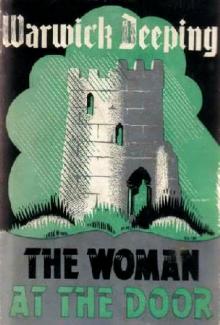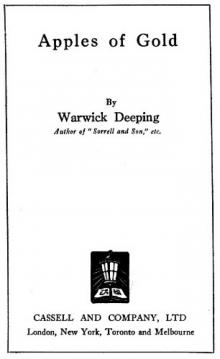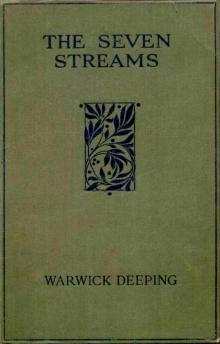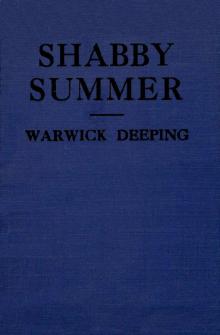- Home
- Warwick Deeping
The Short Stories of Warwick Deeping
The Short Stories of Warwick Deeping Read online
* A Distributed Proofreaders Canada eBook *
This ebook is made available at no cost and with very few restrictions. These restrictions apply only if (1) you make a change in the ebook (other than alteration for different display devices), or (2) you are making commercial use of the ebook. If either of these conditions applies, please contact a FP administrator before proceeding.
This work is in the Canadian public domain, but may be under copyright in some countries. If you live outside Canada, check your country's copyright laws. IF THE BOOK IS UNDER COPYRIGHT IN YOUR COUNTRY, DO NOT DOWNLOAD OR REDISTRIBUTE THIS FILE.
Title: The Short Stories of Warwick Deeping
Date of first publication: 1930
Author: Warwick Deeping (1877-1950)
Date first posted: Aug. 13, 2018
Date last updated: Aug. 13, 2018
Faded Page eBook #20180859
This ebook was produced by: Al Haines, Mardi Desjardins & the online Distributed Proofreaders Canada team at http://www.pgdpcanada.net
The
SHORT STORIES
of
WARWICK DEEPING
CASSELL
AND COMPANY, LIMITED
London, Toronto, Melbourne & Sydney
First published 1930
Printed in Great Britain
CONTENTS
PAGE
1. Wilmer’s Wife 1
2. Two Men 23
3. The Pool of the Satyr 37
4. Old Fagus 83
5. That Vulgar Person 97
6. The Immortals 112
7. The Harmless Satyr 133
8. Tom Silver’s Bus 159
9. Poet and Peasant 174
10. Gustave 189
11. Sand Dunes 204
12. The First Wrinkle 222
13. Shipwreck and a Shrew 237
14. Caliban 258
15. Noise 277
16. Six Months to Live 296
17. Sennen Climbs a Wall 347
18. Rachel in Search of Reality 360
19. Ridicule 374
20. The Great Saaba Bridge 388
21. The Blue Tulip 404
22. A Red Blind 418
23. The Three Trees 437
24. The Red Van 454
25. Stockings 472
26. Sappho 485
27. The Black Cat 503
28. The Other Woman 517
29. What About It? 535
30. Contraband 549
31. Heritage 597
32. Discord 615
33. Restitution 628
34. At “The Golden Palace” 643
35. The Hesperides 660
36. Elizabeth 674
37. The Man Who Came Back 688
38. The Child 705
39. Paternity 720
40. The Strange Case of Sybil Carberry 736
41. The Cave 791
42. Precious Stones 805
43. Barron’s Broken Head 823
44. In the Snow 838
45. Laughing Sickness 852
46. The Man with the Red Tie 867
47. Escape 881
48. The Sand-pit 896
49. The Liars 911
50. The Broken Violin 923
51. The Son 940
THE SHORT STORIES
OF
WARWICK DEEPING
* * *
WILMER’S WIFE
I
Wilmer was sitting in front of the fire, his elbows on his knees, his fists under his chin. His slippers lay on the hearth-rug just as he had kicked them off. His pipe had gone out, but he held it gripped between his teeth.
“What a mockery!” he thought, and glanced at the empty chair beside him.
It was a very ordinary arm-chair, upholstered in blue tapestry, with rolled arms and a comfortable sloping back. A green cushion lay on the seat, and as Wilmer glanced at it a flicker of pain seemed to pass across his face. It had been his wife’s chair, and that green cushion had formed the familiar halo behind her bronze-brown head.
He stared at the cushion.
His wife had been dead for a year. She lay in that North London cemetery, deep in the dreary clay of it, and she had died just before he had become so fatuously famous.
For his fame was fatuous, since it had come to Wilmer when it had ceased to matter, when it was useless, and he had ceased to care.
Had it come a year earlier how different things might have been.
The house-bell rang. He heard the maid go to the door, and a moment later she was looking kindly at the bent back of him and holding out his letters.
“Letters, sir.”
“Put them on the table, Mary.”
“Shall I turn on the light, sir?”
“No; don’t bother.”
She went out, closing the door gently, with pity in her pleasant, unsubtle eyes. “Poor gentleman, he had taken it to heart;” and Wilmer sat there, staring at the fire, that most lonely and lost of creatures, a man whose soul-mate had vanished and left him in the darkness.
Presently he turned and picked up the letters. There were quite a number of them, a proof of the public’s delight in one of its latest pets. Wilmer glanced perfunctorily at the envelopes, bending down before the firelight, with his thin and sensitive face lit up by the glow. What a budget! Letters from enthusiastic young ladies beseeching him for an autograph. Another letter from a titled person asking him to present her with some of his books to be sold at a charity bazaar. Yet another letter from a cinematograph company, desiring to be informed whether the film rights of his next novel had been disposed of.
And a letter from his literary agents. He recognized the impressive notepaper used by Messrs. Wagstaffe and Plater.
“Dear Mr. Wilmer,
“Messrs. Macalpine are anxious to receive the MS. of your autumn novel.
“We have pleasure in informing you that ‘Tempest’ has reached a tenth large edition.
“The news from the U.S.A. is magnificent. ‘Tempest’ is still the bestseller. Etc. etc.——”
Wilmer threw the letter into the fire and watched it burn. The curling, reddening sheets seemed to writhe mockingly.
Yes, what a damned mockery it was!
A year ago he had been a poor man—so poor that he had been unable to give his wife that last great chance which might have saved her life. For fifteen years she had given him love, courage and understanding; she had been the human triumph behind the bitterness of his failure; she had worked and smiled in this shabby little Canonbury house, filling it with a spiritual tenderness. When he had gone down into the deeps, her love had picked him up, and with a comrade’s courage had set him on his feet again.
“Go on, Peter. Some day it will come to you.”
And it had come, but after her death, after he had ceased to care, and that was where the damned irony of it wounded him. “Tempest,” a fragment of blood and of tears that had brought him so much material plunder, had been written while death had come nearer and nearer. He had read it to her, chapter by chapter. He had finished it a month before she had died. And it had gone out to the world with her name upon the page of dedication.
“To Kitty.”
And Kitty did not know.
Yet, how he had striven to convince himself that Catharine Wilmer did know, and that all that had happened to him since was as real to her as it was to him. Death and survival had not vexed him until he had found himself alone, and then he had struggled in the darkness outside the gate of the great mystery, trying to penetrate it, to feel Kitty’s presence somewhere in the beyond.
He had failed, though there had been moments when he could have sworn that she was near him, sitting in that
chair.
He could remember waking at night after she had died, and imagining her near him, quietly breathing.
“Kitty!”
And then, emptiness, and the realization of it, and the anguish of an inexorable silence.
II
Sitting before the fire, Wilmer told himself that there was no survival. Death was the end of things—a disaster that could not be retrieved.
A flutter of black ash recalled his agent’s letter and its opening sentence:
“Messrs. Macalpine are anxious to receive the MS. of your autumn novel.”
Wilmer got up and turned on the light. At the curtained window stood his desk, with papers of notes and a wad of unruled foolscap upon it, the pen laid neatly across the inkstand. During the daytime the window looked out on a little, black walled sooty garden in which grew a scraggy lilac, one or two hollies, and a few other shrubs. For ten years he had sat at that window, writing. He had been a man of an impetuous untidiness, but now this table of his was meticulously neat, for it was a dead table where no live thought flowed.
Wilmer was unable to write. Since his wife’s death his inspiration had deserted him.
For six months he had made a fight of it, sitting down grimly at that desk, and producing nothing but disjointed and unconvincing nonsense. In the end he had given it up. His agents were asking for the autumn book, and the book did not exist. Moreover, Wilmer did not care.
What did it matter? He glanced at the clock on the mantelpiece, stood a moment in an attitude of deep thought, and then went upstairs to his bedroom. At the top of the stairs he paused to call to the old servant.
“Mary.”
A door opened.
“Did you call, sir?”
“I shall be out to dinner. Take the evening off. Go to the pictures.”
“I would just as soon be at home, sir.”
“No, go out,” he said, with a touch of irritation; “it will do you good.”
A few minutes later Wilmer was in the street, walking fast, but with no definite objective before him. His body was a mere automaton. He felt dissociated from it, this poor thing of the flesh that had to be fed and clothed and put to bed. His mood was one of strange detachment, for the ties that bound him to life had grown weak and frail, mere threads of gossamer waiting to be broken by some sudden impulse.
“Why should one live?”
He found himself in Upper Street—a shadow among shadows—under the haze of a February sky. It was cold, with a dry frostiness in the air, and the lights from the street lamps and the shop windows spread a soft blurred canopy between the houses. People passed him, and were passed by him; the roadway was clamorous and discordant, and yet he had a feeling that everything was unreal, and that he—the man who proposed to die—was the one and only reality. All these people were the mere shadows of his own sense impressions. Already—they were dead and did not know it. Beyond the edge of desire lay the one reality, nothingness.
Wilmer was unconscious of the passing of time, but when he returned to the familiar street he seemed to recognize something dramatic in its dullness. He leaned against a brick gate-pillar and looked at his own house, that little black early Victorian box of bricks where so much and yet so little had happened. The house had a friendly and intimate look. Its eyes seemed to meet his with a stare of infinite understanding.
“Yes, come in out of the night,” it said. “You and I will be together. You shall do just what you please, and I shall not utter a word.”
Wilmer smiled. He crossed the road, walked up the paved path, took out his key and opened the door. A moment later he had closed it behind him, and found himself standing in the darkness of the passage hall. It was familiar, yet strange and silent; and yet—as he stood there—he felt that its silence was alive. A shiver of awe went down his spine. He listened. For a moment he held his breath.
He had a feeling that there was someone in the house, and so strong was this feeling that he challenged the house’s silence.
“Mary—Mary—have you gone out?”
No one answered; but for fully a minute Wilmer stood straining his ears, his heart beating fast and hard. It was as though there—was—something there, something that lay just beyond the perceptive power of his senses—a presence intuitively felt. He was aware of a sense of strain and of tension, as though his self were striving to reach up and out beyond the limitations of his physical body. There was something to be touched, heard, seen, if only he could get beyond the ineffectual flesh.
“Kitty?”
A mysterious excitement seized him. He groped his way down the passage, arms extended, his eyes searching the darkness. A faint line of light showed under the sitting-room door. He found the handle, and pushing the door open, stood looking into the room.
Mary had made up the fire before going out and hung the fire-guard on the bars, and in the light of the little quiet flames Wilmer saw his wife’s chair. It was empty. Of course it was empty. And yet, as he closed the door and moved towards the centre of the room, he found himself questioning its emptiness.
“Supposing she is there?”
He felt an inward trembling.
“There—but invisible. After all one’s senses shut one in. There may be something that can go beyond the senses.”
He drew into the shadow of a corner where the bookcase stood.
“I could swear—that I felt——”
And then his hands went out appealingly.
“Kitty, if you are there, give me some sign, if such a thing is possible.”
The firelight flickered and there was silence; and swept away by some helpless impulse, Wilmer threw himself on his knees by the chair, and buried his face in the green cushion. He remained quite still, with a rigid stillness, but presently he raised his face, and it was the face of one who listened.
Moreover, it had an expression of wonder and of expectancy. He turned, and leaning against the chair, stared at the fire, for somewhere within himself a little, distant voice seemed to be speaking.
“Peter, the holiday we never had, the holiday we always talked of. Sunlight—and the blueness of sea and sky.”
His face twitched; one hand gripped the green cushion.
“Somewhere in the south. I want to see palm trees, Peter, and the mimosa——”
A spasm of emotion seized him.
“By God—I remember. Why shouldn’t she be with me in the spirit? We’ll go.”
III
Wilmer made all his arrangements through Messrs. Cook’s office in Pall Mall.
When he entered the office about ten o’clock next morning he held the heavy swing-door open for a moment as though allowing a companion to pass through. He was smiling. At the long counter a clerk glanced at him inquiringly.
“Yes, sir?”
“I want to go to Algiers. Can you arrange everything?”
“You will want a sleeper, sir, and a cabin? There is rather a rush just now. And the hotel?”
“The best there is. It must have a garden, and not be in the middle of the town.”
“The ‘Mustapha’ would suit you, sir; fairly quiet and beautifully situated.”
“Can you wire for a room?”
“Certainly. Accommodation on the train and on the boat from Marseilles for one?”
“For two.”
“A two-berthed cabin, and a sleeper for two. And the hotel? The ‘Mustapha’ has suites.”
“I should want a suite facing south.”
“Very good, sir. You have a passport?”
“No.”
“We shall have to arrange that. I take it, sir, that you wish to leave——?”
“As soon as you can obtain the necessary tickets and accommodation.”
“We will wire at once, sir. I will make a note of all the details.”
Wilmer left by the boat train on a raw February morning. No one saw him off; in fact, no one but the old servant knew that he was going, and in his pocket he carried a letter from his literar
y agents—an anxious and worried letter. Wilmer had written to tell Messrs. Wagstaffe and Plater that his next novel would not be ready for autumn publication, and had hinted that its completion was a matter of indifference to him. His agents had diagnosed “swelled head.”
He had the expectant look of a man setting out upon a memorable adventure. At Calais his calmness in the ridiculous scuffle at the “customs,” might have suggested the experienced traveller. He had a detached air; he seemed to dream above the heads of the excited crowd.
“Premier classe, monsieur?”
“Wagons-lits.”
His porter delivered him into the hands of a little swarthy man in a chocolate-coloured uniform who conducted Wilmer to his sleeper.
“For two, monsieur.”
“Yes.”
Wilmer closed the door and arranged his baggage, and he behaved as though someone were sitting on the seat by the window.
“Not a bad crossing, Kitty. You would like the lower berth, dear. I shall be able to tuck you up before climbing upstairs.”
Later, the attendant—a man of commerce—realized that Wilmer had no travelling companion.
“But monsieur is alone?”
“No.”
The man stared.
“There is a gentleman who has no berth. If monsieur is agreeable——”
Wilmer was not agreeable. He showed a touch of fierceness. He had paid for his compartment and he did not wish to be disturbed, and the attendant, pocketing a fifty-franc note, left him alone. The Englishman was either a rich egoist or a lunatic. The tip was the thing that mattered.
At Marseilles the sun shone, and Wilmer, the sole occupant of a two-berthed cabin, stood on the deck of the Timgad and watched the golden figure of Notre Dame de Mont Gard grow dim against the blue of the northern sky. The sea was calm, and the deck-steward was portioning out deck-chairs. Wilmer asked him to reserve two.
“What name, monsieur?”

 The Woman at The Door
The Woman at The Door Apples of Gold
Apples of Gold The Seven Streams
The Seven Streams Old Wine and New
Old Wine and New No Hero-This
No Hero-This Two in a Train
Two in a Train Valour
Valour Shabby Summer
Shabby Summer Love Among the Ruins
Love Among the Ruins The Short Stories of Warwick Deeping
The Short Stories of Warwick Deeping